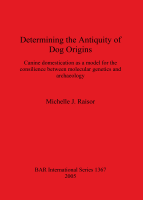Description
Archaeologists have favoured a date of 14,000-15,000 years before present (BP) for canine domestication. However, recent studies of mutations in the mitochondrial DNA sequence by molecular geneticists have implied that dogs were domesticated over 100,000years ago, which has challenged traditional theory. Geneticists have further hypothesized that dogs originated from wolf ancestors based upon the number of substitutions observed in dog and wolf haplotypes. Although both disciplines provide substantial evidence for their theories, the origin of dog domestication remains controversial and several areas continue to be debatable. In this work the author presents an alternate theory of canine domestication utilizing data gathered from the archaeological record and molecular research. She hypothesizes that dogs diverged naturally from wolves 100,000 years ago as a result of the natural course of evolution, not human intervention, and had already evolved into a dog prior to being domesticated by humans 14,000-15,000 years ago. Evidence is presented to clearly show that this hypothesis is a more accurate scenario of canine domestication.











